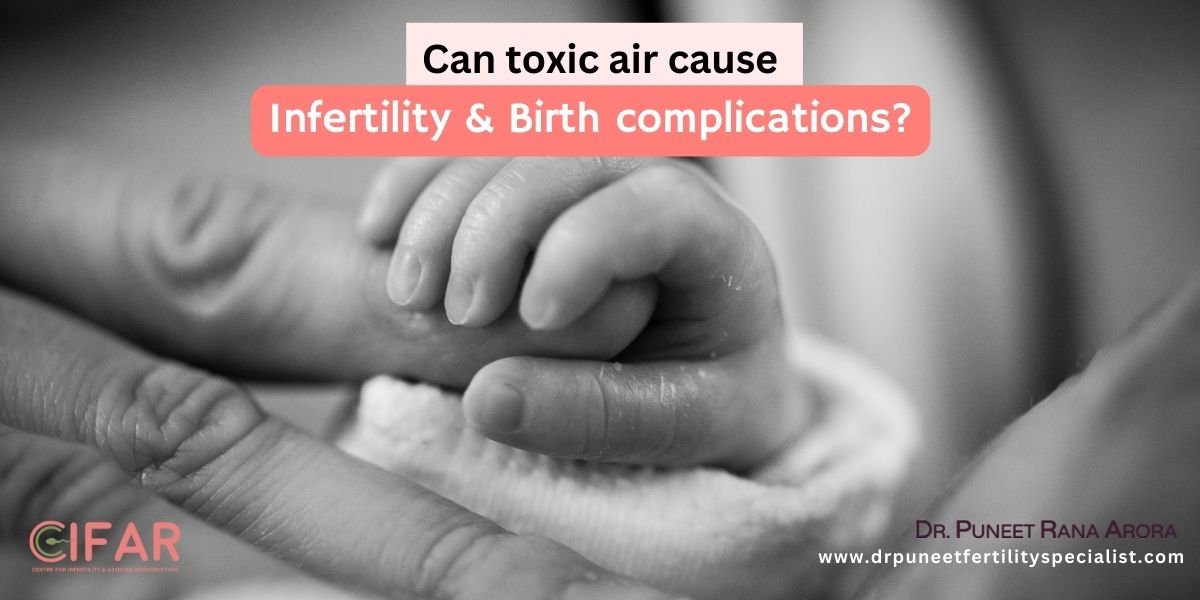Yes, exposure to toxic air pollutants has been linked to various adverse health effects, including Infertility , reproductive issues and birth complications. Air pollutants such as particulate matter (PM), nitrogen dioxide (NO2), sulfur dioxide (SO2), carbon monoxide (CO), and volatile organic compounds (VOCs) can have harmful effects on the reproductive system.
“Certain air contaminants, specifically diesel exhaust, lead, and copper, appear to have endocrine-disrupting effects on female reproductive – says Dr Puneet Rana Arora, Infertility Specialist, Gynecologist, CIFAR Infertility Center .
Additionally, some of these endocrine “disruptors” may interfere with the thyroid axis and affect metabolic problems including obesity and insulin resistance, which are directly linked to infertility. Additionally, these disruptions have estrogenic, antiestrogenic, and antiandrogenic activity.”
According to WHO, Millions of people struggle with infertility, which also impacts their families and communities. An estimated one in six persons globally who are of reproductive age will become infertile at some point in their lives.
Infertility:
Studies have suggested that exposure to certain air pollutants may be associated with decreased fertility in both men and women. For example, air pollution has been linked to reduced sperm quality in men and disruptions in menstrual cycles and hormonal imbalances in women.
Here are some ways in which toxic air can potentially impact fertility:
- Disruption of Hormonal Balance
- Oxidative Stress
- Inflammation
- Genetic Damage
- Reduced Semen Quality
Birth Complications:
Pregnant women exposed to high levels of air pollution may be at an increased risk of complications during pregnancy. These complications can include
- preterm birth,
- low birth weight
- developmental issues.
- Preeclampsia
- Birth Defects
Exposure to air pollutants during pregnancy has also been associated with an increased risk of conditions such as preeclampsia.
It’s important to note that the specific effects can depend on the type and concentration of pollutants, as well as the duration of exposure.
Like every contaminant for both IVF recipients and women in general who are of reproductive age.

Source : https://www.ncbi.nlm.nih.gov/pmc/articles/PMC6311303/
Additionally, vulnerable populations such as pregnant women, infants, and individuals with pre-existing health conditions may be more susceptible to the adverse effects of air pollution.
Efforts to reduce air pollution through environmental regulations, lifestyle changes, and the use of cleaner technologies can contribute to improving reproductive and maternal health outcomes.
Pregnant women and those planning to conceive may benefit from avoiding exposure to air pollution as much as possible and discussing potential risks with their healthcare providers.
How IVF Expert helps you in infertility treatment causes by toxic air?
In vitro fertilization (IVF) experts, Dr Puneet Rana Arora, play a crucial role in helping individuals or couples facing infertility, including cases where environmental factors, such as exposure to toxic air, may be contributing to fertility issues.
- Assessment and Diagnosis:
- Identifying the Impact of Toxic Air
- Personalized Treatment Plans
- Recommendations for Lifestyle Changes:
- Preconception Counselling
- Assisted Reproductive Technologies (ART)
- Monitoring and Adjusting Treatment
References
https://www.ncbi.nlm.nih.gov/pmc/articles/PMC6311303/
https://www.who.int/news-room/fact-sheets/detail/infertility
